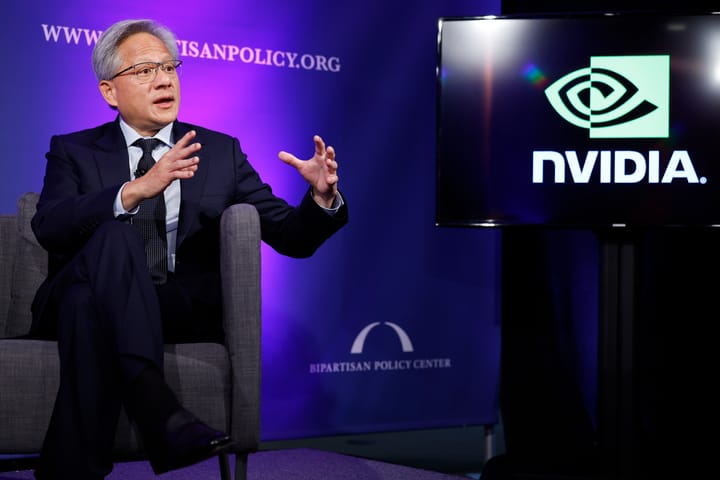A coalition of groups focused on corporate power is calling on state attorneys general to bring antitrust actions against chipmaking giant Nvidia, which is facing a federal investigation over anti-competitive business practices.
In a letter sent today to the National Association of Attorneys General (NAAG), the groups urge the state officials to initiate antitrust enforcement action against Nvidia over alleged anti-competitive practices that lock in customers—and lock out smaller players.
The letter, sent to NAAG executive director Brian A. Kane by the nonprofit Demand Progress Education Fund and eight other organizations, calls attention to the impacts on state economies and startups when a company at the scale of Nvidia can pick favorites among its Big Tech buyers, warning it can leave “small businesses paying higher prices and consumers subject to privacy violations and other harms.”
The letter argues that antitrust actions brought by state attorneys general (AGs) should complement federal probes and scrutiny from regulators, and can lead to more comprehensive resolutions.
“State attorneys general can be champions in the equitable development of A.I. by taking on Nvidia’s near-total stranglehold on the market for chips that power A.I.,” said Emily Peterson-Cassin, Demand Progress Education Fund’s corporate power director.
“By taking action, state AGs can turn up the heat on Nvidia and send a strong message that this kind of anti-competitive market manipulation has real consequences. State AGs are uniquely poised to protect businesses in their state by ensuring that one single company doesn’t own the future of A.I.,” Peterson-Cassin said.
Nvidia’s explosive growth over the past few years has made it the darling of Wall Street and one of the most valuable companies in the world. The company’s dominance in the chip market is stark: it has 88% of the total market for GPU chips, and an incredible 98% of the market for data-center chips powering A.I. projects, by reports this year.
Regulators have taken notice of Nvidia’s massive market position. In September, the U.S. Department of Justice initiated an antitrust investigation into Nvidia, sending subpoenas to it and other technology companies looking into anti-competitive practices that hinder smaller companies, according to Bloomberg. In addition to requesting information on alleged preferential pricing and supply to exclusive customers, the D.O.J. probe is scrutinizing Nvidia’s acquisition of the A.I. startup RunAI.
China has also launched an antitrust investigation into the company over violations of antitrust laws and the terms of a 2020 agreement related to its acquisition of Mellanox Technologies.
The new letter urges state AGs to bring focus on Nvidia’s business practices during a time of presidential transition. “State-level lawsuits can lead to more tailored remedies that address specific harms faced by local communities, which might be overlooked in the broader federal and international cases,” it says.
The incoming Trump administration will turn over the leadership at D.O.J., but antitrust-focused lawmakers in Congress are keeping up pressure on Nvidia’s dominance in the A.I. space.
Last week, Rep. Mary Gay Scanlon (D-Pa.), a member of the House Judiciary Committee’s subcommittee on antitrust issues, sent a letter addressed to outgoing Assistant Attorney General Jonathan Kanter, encouraging the D.O.J.’s Antitrust Division to continue its investigation into Nvidia’s anti-competitive practices, such as pushing clients into bundling and exclusivity deals.
“In an era marked by rapid advances in A.I technologies, it is important that the D.O.J. and other enforcers prevent anti-competitive behavior that undermines innovation and harms consumers,” the Scanlon letter states.
Several lawsuits have been filed against Nvidia this year accusing the company of anti-competitive behaviors. One suit filed in September by a Texas-based startup Xockets accuses Nvidia and Microsoft of patent infringement and monopolizing chip markets, disadvantaging smaller A.I. companies.
In the third quarter of this year, Nvidia more than doubled its profits over last year, and its stock price has more than doubled in 2024.
In its most recent report on its political activity from June 2023, Nvidia disclosed membership in trade associations that spend millions of dollars annually on lobbying the federal government, including the Information Technology and Innovation Council and the National Venture Capital Association. The previous year, the company disclosed membership in the Consumer Technology Association, of which Apple and Microsoft are among the core members.
At the end of 2022, Nvidia started up its own D.C. lobbying activity, after not spending on federal lobbying in previous years, according to Senate records. The chipmaker hired four lobbyists with the bipartisan Tiber Creek Group, and last year beefed up its corps with a handful more from the Nickles Group, a firm founded by longtime Republican Oklahoma senator Don Nickles.
The letter to the state AG association was also joined by the Artist Rights Alliance, Economic Security Project Action, Future of Music Coalition, Institute for Local Self-Reliance, Lake Research Partners, NextGen Competition, Open Markets Institute, and the Revolving Door Project.
Even with Nvidia’s market dominance, startups are angling for a foothold in the burgeoning A.I. field. This June, Fernando Vidal, co-founder of 3Fourteen Research, told CNBC, “Nobody can deny that today Nvidia is the hardware you want to train and run A.I. models. But there’s been incremental progress in leveling the playing field, from hyperscalers working on their own chips, to even little startups, designing their own silicon.”



